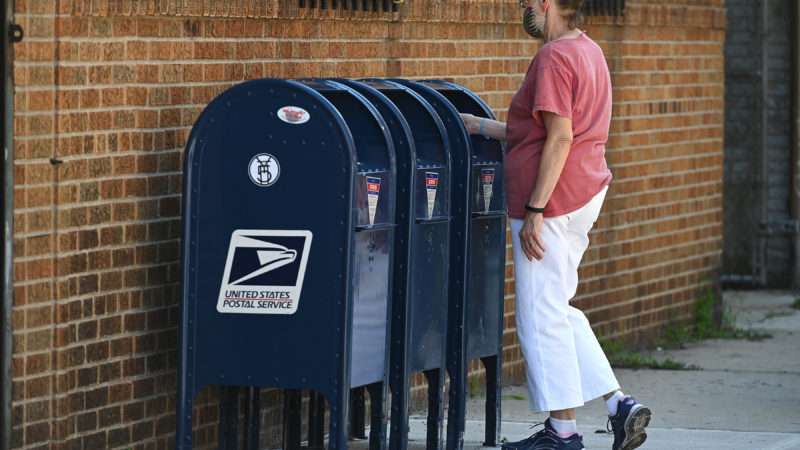
After years of unfulfilled predictions about high-tech health care, the use of telehealth—like telecommuting—boomed during the pandemic and lockdowns. While the delivery of medical services via phone call, videoconference, and other electronic communications isn’t universally appropriate, it’s often helpful, and a huge boon for people who have limited mobility or live far from medical providers.
But while the COVID-19 pandemic has driven the use of telehealth technologies, that’s largely because of the emergency suspension of regulatory barriers. Once the crisis is over, telehealth could disappear as an option for many people if regulators move to reclaim the ground they temporarily ceded.
I’ll say up front that, as a rural dweller who lives far from most specialty providers, I’m a big fan of telehealth. In recent months, I’ve had the preliminaries of a skin cancer diagnosis done through emailed photos and a videoconference with a dermatologist 100 miles away. My son’s acne was similarly treated by a distant doctor. The proliferation of phones with built-in cameras, video tools, and secure online portals for sharing files and lab results makes much of this a breeze.
Not everything can be done remotely, of course. I did have to make an in-person trip for a biopsy, and another to have the offending cells sliced away. But my son has yet to meet his dermatologist in-person. We’ve avoided multiple long drives and opportunities for catching COVID-19 or other diseases.
My wife is on the other side of this phenomenon in her role as a pediatrician. She meets with patients and their families through videoconference calls as a tactic for reducing the chance of infection.
We haven’t been alone in embracing remote medical visits. Department of Health and Human Services (HHS) data shows that “nearly half of Medicare primary care visits were provided via telehealth in April, compared with less than one percent before the [public health emergency] in February.”
Even after lockdowns eased, many medical appointments continued through phones and computers. “As in-person visits started to resume from mid-April thru May, the use of telehealth in primary care declined somewhat but appears to have leveled off at a persistent and significant level by the beginning of June,” HHS adds.
Telehealth services were so rare before this year partially because of discomfort among providers with providing services to people who aren’t physically present. It’s new, it’s different, and it’s not always appropriate to diagnose and treat patients without in-person visits.
But even if physicians and other providers were less resistant, they still would have been stymied by regulatory barriers that hobbled the use of telehealth. Until March of 2020, seeing a patient remotely meant navigating a maze of privacy rules, licensing restrictions, and the very real likelihood that the visit was an act of uncompensated charity.
“Beginning on March 6, 2020, Medicare—administered by the Centers for Medicare & Medicaid Services (CMS)—will temporarily pay clinicians to provide telehealth services for beneficiaries residing across the entire country,” CMS announced earlier this year. “Prior to this announcement, Medicare was only allowed to pay clinicians for telehealth services such as routine visits in certain circumstances. For example, the beneficiary receiving the services must live in a rural area and travel to a local medical facility to get telehealth services from a doctor in a remote location. In addition, the beneficiary would generally not be allowed to receive telehealth services in their home.”
Medicare isn’t the only game in town when it comes to paying for care, but Medicaid follows much the same rules, and, sad to say, private insurers tend to stick closely to the government program’s policies.
Payment restrictions, while a huge concern, weren’t the only regulatory barrier to the use of telehealth. A list of pandemic-inspired HHS policy changes regarding telehealth assures providers that “the federal government has taken concrete steps to make telehealth services easier to implement and access during this national emergency.”
Under the revised rules, providers can now treat patients across state lines—something not permitted in the past. They can also see new patients online and not just continue existing relationships.
Importantly, given the minefield of privacy rules in the Health Insurance Portability and Accountability Act (HIPAA), providers can meet with patients using common “non-public facing” tools including Apple FaceTime, Facebook Messenger video chat, Google Hangouts video, Zoom, and Skype. That means patients don’t have to install and master the use of specialized software to see the doctor.
Also important: “A practitioner can prescribe a controlled substance to a patient using telemedicine, even if the patient isn’t at a hospital or clinic registered with the DEA.”
But, as helpful as all that is, don’t get too comfortable. “These changes are temporary measures during the COVID-19 Public Health Emergency and are subject to revision,” warns the document.
Also temporary is the relaxation of state rules—medical licensing, in particular—that stand in the way of telemedicine. Traditional licensing makes it illegal to hold a videoconference appointment across a state border, although driving across that border to see the same doctor in person is perfectly acceptable.
“The removal of state licensure restrictions allowed physicians to practice across state lines, which played a major role in allowing telehealth to step in as a national ‘load balancer’ of medical services,” points out Roy Schoenberg, a physician and head of Amwell, a telehealth company. “For the first time in history, the nation could beam in specialists from where they were available to where they were needed most.”
If old-fashioned licensing requirements are reinstated, that will leave patients and providers alike stuck in little boxes of medical care defined by their state borders, even though they have the ability to easily speak and share information with anybody on the planet.
Then again, if old payment, HIPAA, and prescription restriction are put back in place, it won’t matter what size boxes we’re stuck in, since telehealth will go back to being a rarity. That uncertainty hangs like a cloud over the whole practice of remote medicine.
“Multiple physicians mentioned that the lack of certainty regarding the post-pandemic policy environment reduced their willingness to invest in telehealth over the long term,” writes Lori Uscher-Pines, a RAND Corporation senior policy researcher. “By signaling their intentions sooner rather than later regarding payment policy, policymakers could reduce uncertainty and encourage investment in sustainable telehealth models. For example, Congress should act to permanently remove geographic and originating site requirements for telehealth in Medicare.”
To his credit, President Donald Trump ordered in early August that some telehealth rule revisions be extended. But the effect is largely limited to rural areas. And what can be done by executive order can be undone the same way.
It’s great that regulators backed off a bit on telehealth-hobbling red tape that proved to be life-threatening during a pandemic. But if those rules are potentially deadly during a crisis, they’ll still be inconvenient and dangerous once life returns to something like normal. If they care at all about health, politicians and bureaucrats need to get out of the way—permanently.
from Latest – Reason.com https://ift.tt/32bQQ9H
via IFTTT




